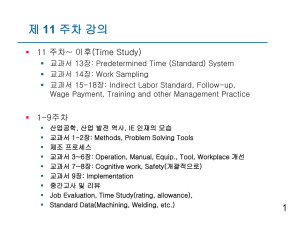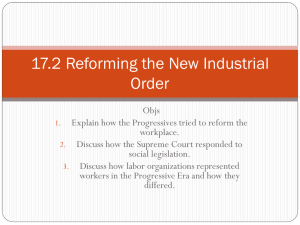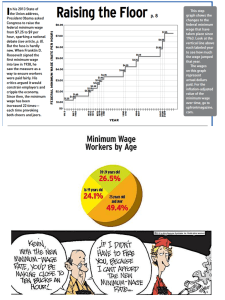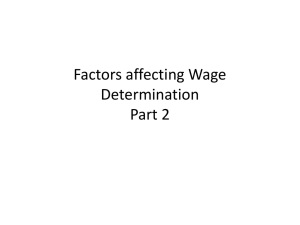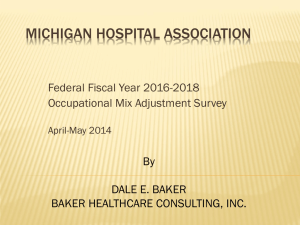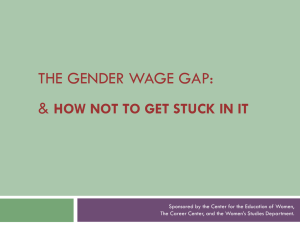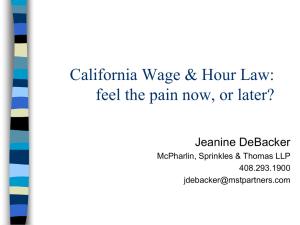Annex D - Public and Commercial Services Union
advertisement
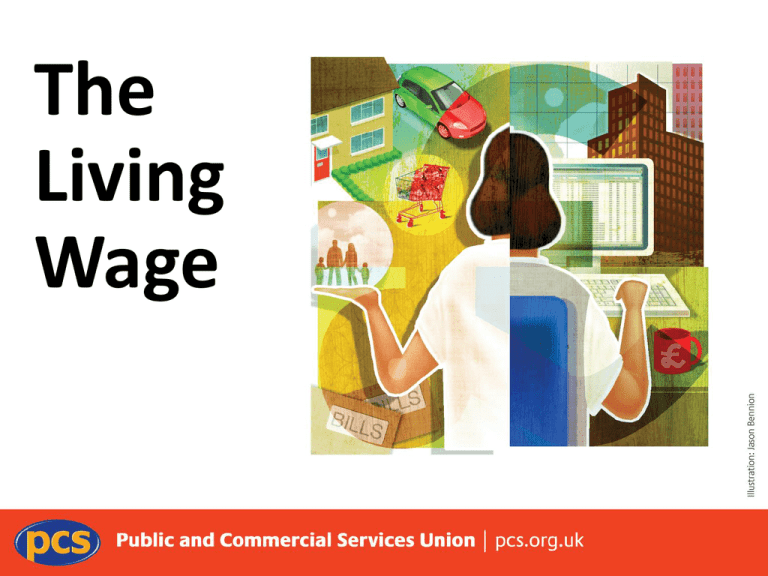
The Living Wage What is a Living Wage? An early demand from trade unions was the demand for wages that would allow workers to buy the food, shelter and clothing needed for themselves and their families to live – a living wage. What is a Living Wage? At a time of economic crisis and high unemployment, and in the wake of the general strike, Labour MP James Maxton argued that a living wage would allow the population to consume the essential things of life, food, better housing, better furnishings, better sanitation etc and this in turn, would stimulate growth, jobs and prosperity for the nation at large. Put simply he believed putting money into the pockets of poor people was to be a way out of decline. In the event, though 124 Labour party MPs supported the Bill, it failed to win sufficient support. What is a Living Wage? The Living Wage is now an hourly rate set independently every year (by the Greater London Authority in London and Loughborough Uni for elsewhere) Cost-of-living data is used to give the minimum pay rate required for a worker to provide the essentials of life for them and their family In London the current rate is £8.55 per hour Outside of London the current rate is £7.45 What is a Living Wage? The living wage is the hourly wage needed for an employee to “achieve an adequate level of warmth and shelter, a healthy palatable diet, social integration and avoidance of chronic stress”. Living wage rates are based on minimum income standards methodology and take account of real living costs for essential goods and services. Comparison between NMW and Living Wage rates Year NMW LW (National) Difference LW (London) Difference 2003 4.50 - - 6.40 1.90 2004 4.85 - - 6.50 1.65 2005 5.05 - - 6.70 1.65 2006 5.35 - - 7.05 1.70 2007 5.52 - - 7.20 1.68 2008 5.73 6.88 1.15 7.45 1.72 2009 5.80 7.09 1.29 7.60 1.80 2010 5.93 7.20 1.27 7.85 1.92 2011 6.08 7.20 1.12 8.30 2.22 2012 6.19 7.45 1.26 8.55 2.36 Who pays it? Over 100 major organisations including 10 universities and a number of colleges are already paying the Living Wage Outside of London successes have been achieved in colleges, councils, NHS Scotland, Scottish Enterprise and Scottish Housing Association Nearly all major banks and law firms in London pay the London Living Wage. Living Wage and PCS Over the past 18 months, PCS members working for companies such as Hewlett Packard, Fujitsu, Balfour Beatty Workplace, Steria and Atos have all achieved the Living Wage as the minimum rate of pay for any worker employed delivering a government contract. BUT – many of our colleagues, both civil servants and private sector members, currently earn below the Living Wage. Government contracts PCS want the Living Wage to be the minimum amount any of our members earn. We believe that departments/agencies handling public money have a responsibility to ensure that all contractors providing a service comply with equality legislation and provide good working conditions. The contracting out of services should not dilute employment standards and our eventual aim is that management should insert a Living Wage clause in every commercial contract with their contractors. Why pay a Living Wage? Employers who have implemented the Living Wage have reported that they experienced better retention of staff and improved service as a result. Living Wage employers have found that they have made significant savings by reducing absenteeism and turnover and improving productivity. The Living Wage matters “Achieving the living wage has really made a difference to my life. I am a young single Mum bringing up a baby on my own and it’s been really difficult to make ends meet. I am now in the position, thanks to PCS, of being able to afford some simple luxuries that we never had before. Also for the first time this year we had a holiday, it was only to Wales but it was great to relax and spend some quality time together” PCS Fujistu member, Netherton What we can do

